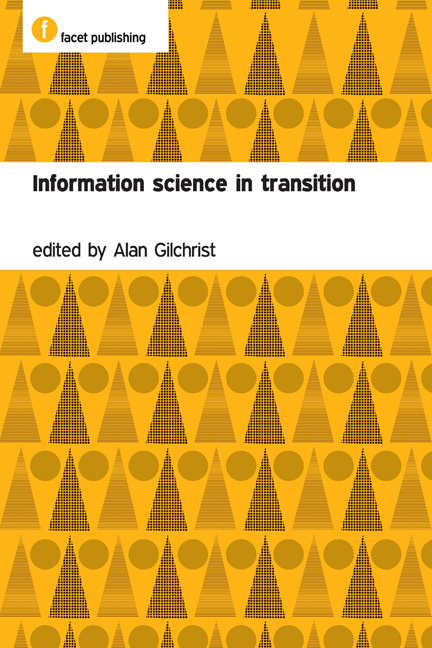Book contents
- Frontmatter
- Contents
- Contributors
- Preface
- Editorial
- Guest Editorial: Meeting the challenge
- 1 Fifty years of UK research in information science
- 2 Smoother pebbles and the shoulders of giants: the developing foundations of information science
- 3 The last 50 years of knowledge organization: a journey through my personal archives
- 4 On the history of evaluation in IR
- 5 The information user: past, present and future
- 6 The sociological turn in information science
- 7 From chemical documentation to chemoinformatics: 50 years of chemical information science
- 8 Health informatics: current issues and challenges
- 9 Social informatics and sociotechnical research – a view from the UK
- 10 The evolution of visual information retrieval
- 11 Information policies: yesterday, today, tomorrow
- 12 The disparity in professional qualifications and progress in information handling: a European perspective
- 13 Electronic scholarly publishing and Open Access
- 14 Social software: fun and games, or business tools?
- 15 Bibliometrics to webometrics
- 16 How I learned to love the Brits
- Index
5 - The information user: past, present and future
Published online by Cambridge University Press: 08 June 2018
- Frontmatter
- Contents
- Contributors
- Preface
- Editorial
- Guest Editorial: Meeting the challenge
- 1 Fifty years of UK research in information science
- 2 Smoother pebbles and the shoulders of giants: the developing foundations of information science
- 3 The last 50 years of knowledge organization: a journey through my personal archives
- 4 On the history of evaluation in IR
- 5 The information user: past, present and future
- 6 The sociological turn in information science
- 7 From chemical documentation to chemoinformatics: 50 years of chemical information science
- 8 Health informatics: current issues and challenges
- 9 Social informatics and sociotechnical research – a view from the UK
- 10 The evolution of visual information retrieval
- 11 Information policies: yesterday, today, tomorrow
- 12 The disparity in professional qualifications and progress in information handling: a European perspective
- 13 Electronic scholarly publishing and Open Access
- 14 Social software: fun and games, or business tools?
- 15 Bibliometrics to webometrics
- 16 How I learned to love the Brits
- Index
Summary
Abstract
The emergence of research on various aspects of ‘information behaviour’ is explored and its growth as a subject of academic research is documented. The origin of the field as a potential aid to the development of library and information services is noted, as is the transition from this status to that of a subject for research at PhD level and beyond. The development of the field has thus led to a division between the needs of academia for theoretically grounded work, and the needs of the field of practice for guidance for service development. There is, today, a disconnection between research and practice, to a significant extent: early research was undertaken by practitioners but today academic research dominates the scene. Suggestions are made as to how this disconnection can be repaired.
Introduction
The ‘user’ has been of interest in librarianship and information science for much longer than either has existed as a focus for research. Virtually every development in the field has been concerned with making it easier for the user to access documents or information. Thus, the first ‘union catalogue’ in England was devised to make it easier for the scholar monks to locate wanted manuscripts in monastery libraries:
In the late thirteenth century a union catalog was constructed, which included a unified list of holdings of English monastery libraries, ‘Registrum librorum Angliae’… [1: p. 126].
Charles Ami Cutter's ‘shelf marks’ [2] were designed to make easier the location of a specific book on the shelf, ‘open access’ [see, e.g., 3] was devised to make it easier for the library visitor to get the book he or she wanted without undue delay, Kaiser's ‘systematic indexing’ [4] was devised to enable the rapid location of wanted pieces of information, and so on throughout the history of libraries and information centres.
It took some time, however, before the ‘user’ as a living, breathing person became the focus of attention in information research. Initially, the focus was on the system used, how it was used and by whom. Thus, the first library surveys were designed to discover what categories of persons used libraries, not what those persons did when they were in a library nor what life or work issues were behind their library use.
- Type
- Chapter
- Information
- Information Science in Transition , pp. 95 - 108Publisher: FacetPrint publication year: 2009
- 3
- Cited by



